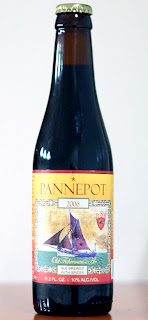 Back during the 1980’s, very few Belgian-brewed ales made it into the Louisville metropolitan area. Early on, there was Merchant du Vin’s portfolio, including Lindemans, Orval, what was then labeled St. Sixtus (now St. Bernardus), and from other importers … maybe Duvel?
Back during the 1980’s, very few Belgian-brewed ales made it into the Louisville metropolitan area. Early on, there was Merchant du Vin’s portfolio, including Lindemans, Orval, what was then labeled St. Sixtus (now St. Bernardus), and from other importers … maybe Duvel?Maybe. Memory doesn’t entirely serve me, but I know that compared with German and Anglo-Irish imports, Belgium wasn’t as well represented on our store shelves. However, Michael Jackson’s pioneering books certainly whetted my appetite for greater tasting opportunities. Eventually, they came to pass.
It had become the 1990’s, and my trips abroad grew more frequent although less lengthy. Diving foursquare into both beer appreciation and pub ownership, I found my attentions diverted toward the classic beer-making areas in Northern Europe. A decade earlier would have been better, but various factors came together to make it a good time to delve into Belgium, albeit a transitional one.
The old local school Belgian brewers referenced by Jackson (and later, Tim Webb) were slowly dying out and yielding to the predictable disturbances of modernity. From one trip to the next, there’d be serious doubt as to whether a glorious artisanal ale sampled previously still would be available.
Fortunately, as became increasingly evident, Belgium was experiencing its own craft brewing revolution. Youth and innovation were stepping into the breach, and the results were (and are) exciting.
It’s now 2009, and the transition continues. Brewers like De Dolle, Achouffe and Fantome were young when my European travels began, and now they’re venerable. Still older family brewing companies like Huyghe, Anker and Van Honsebrouck have entirely reinvented their approaches. A fresh generation of ambitious operators like Alvinne, La Rulles and Struise are keeping the heritage alive. It remains an inspiration to watch, but it’s more inspiring to drink.
Last night I drank a 2007 vintage of Struis Pannepot (Old Fisherman’s Ale). It’s grist for another essay on crumbling international boundaries that Struise credits Pannepot’s name as a tribute to the brewery’s Danish supporters.
More than any single Belgian ale I’ve had lately, Pannepot transports me back to those heady early days of roaming Belgium in search of any label I’d not seen before. While referred to as “spiced,” I find the spice presence very subtle and complimentary to rich malts and dark-colored fruits like dates and raisins. It’s expressive yet balanced, warming and contemplative, and a real treat that reflects the Belgian brewing ethos.
Photo credit: RateBeer








No comments:
Post a Comment